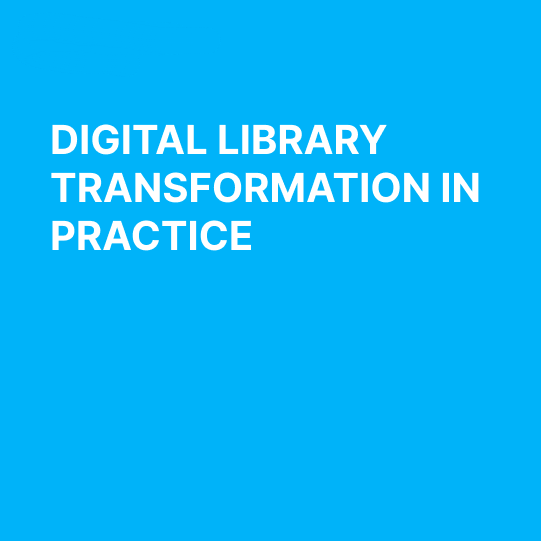SPEAKERS
AGENDA

Libraries & People: from the Books onwards
Practices and Issues of digitization, digitalization, digital preservation within physical and digital public spaces.
Speaker: Annalisa Rossi.
Digital preservation of a special collection
at the Lasallian Library in Rome
Digital preservation has been emphasized, both as a method of providing research and supporting preservation policies. Meanwhile, the management of library special collections requires, from time to time, multidisciplinary approaches on the part of the librarian in order to manage the records from both preservation and information access perspectives.
Examples will be presented to enable the proper preservation of a 19th-century photographic collection while making the photographic material digitally usable.
Speaker: Anna Cascone.
Digitisation as a Way of Making the Library
Collections Accessible: The Case of the National
Library of the Czech Republic
One of the drivers behind the digitisation effort of the National Library of the Czech Republic is the desire to overcome the often limited physical accessibility of its modern collections to the public. The talk explores this factor in two areas: selection of priority titles for digitisation and presentation of the reformatted documents in the digital library.
Speakers: Michaela Bežová,Vojtěch Halama.
Artificial Intelligence and Human Adaptability:
A New Era of Flexible Living
The presentation will explore how artificial intelligence is reshaping human lifestyles, enhancing adaptability, and creating new opportunities for a more flexible way of living in our rapidly changing world focus to LIBRARY SCENARIO.
Speaker: Zainab Ajab Mohideen.
The API: the glue for Digital Transformation
The Application Programming Interface is central to digital transformation in libraries. The journey of digitisation is mediated by key integrations between systems for: Initial digital onboarding; Curation and metadata description; Archiving; Discovery and delivery; Validation and media transformation.
They are also the centre piece for authentication to services, such as single sign-on. The role of the API will be illustrated in with the case study of the Public Records office of Victoria.
Speaker: Edmund Balnaves.
Types of digital repositories
Ensuring information security. Saving and sharing your digital collections with persistent identifiers. Choosing the right repository for your institution.
Speaker: Maria Cotera.
Digital Cultural Heritage as a source for AI
Speaker: Andrija Sagić.
Cultural Heritage Reimagined:
Enhancing Experiences at Onassis Library" will explore how the Onassis Library uses innovative technologies like Virtual Reality (VR), Augmented Reality (AR), and 3D mapping to create an interactive and immersive cultural space. These tools have revolutionized user engagement with historical documents, artworks, and educational content, providing a model for other libraries to adopt similar strategies.
Speakers: Vasiliki Gerontopolou, Nikolaos Sideris.
Digitization of Library Collections: From Selection
to Publishing
Unlocking Heritage: Qatar National Library's End-to-End Digitization workflow, Quality Insights, and Innovative Arabic OCR Solutions
Speaker: Hany A. Elsawy Abdellatif.
Libraries & People: from the Books onwards
Practices and Issues of digitization, digitalization, digital preservation within physical and digital public spaces.
Speaker: Annalisa Rossi.
Digital preservation of a special collection
at the Lasallian Library in Rome
Digital preservation has been emphasized, both as a method of providing research and supporting preservation policies. Meanwhile, the management of library special collections requires, from time to time, multidisciplinary approaches on the part of the librarian in order to manage the records from both preservation and information access perspectives.
Examples will be presented to enable the proper preservation of a 19th-century photographic collection while making the photographic material digitally usable.
Speaker: Anna Cascone.
Digitisation as a Way of Making the Library
Collections Accessible: The Case of the National
Library of the Czech Republic
One of the drivers behind the digitisation effort of the National Library of the Czech Republic is the desire to overcome the often limited physical accessibility of its modern collections to the public. The talk explores this factor in two areas: selection of priority titles for digitisation and presentation of the reformatted documents in the digital library.
Speakers: Michaela Bežová,Vojtěch Halama.
Artificial Intelligence and Human Adaptability:
A New Era of Flexible Living
The presentation will explore how artificial intelligence is reshaping human lifestyles, enhancing adaptability, and creating new opportunities for a more flexible way of living in our rapidly changing world focus to LIBRARY SCENARIO.
Speaker: Zainab Ajab Mohideen.
The API: the glue for Digital Transformation
The Application Programming Interface is central to digital transformation in libraries. The journey of digitisation is mediated by key integrations between systems for: Initial digital onboarding; Curation and metadata description; Archiving; Discovery and delivery; Validation and media transformation.
They are also the centre piece for authentication to services, such as single sign-on. The role of the API will be illustrated in with the case study of the Public Records office of Victoria.
Speaker: Edmund Balnaves.
Types of digital repositories
Ensuring information security. Saving and sharing your digital collections with persistent identifiers. Choosing the right repository for your institution.
Speaker: Maria Cotera.
Digital Cultural Heritage as a source for AI
Speaker: Andrija Sagić.
Cultural Heritage Reimagined:
Enhancing Experiences at Onassis Library" will explore how the Onassis Library uses innovative technologies like Virtual Reality (VR), Augmented Reality (AR), and 3D mapping to create an interactive and immersive cultural space. These tools have revolutionized user engagement with historical documents, artworks, and educational content, providing a model for other libraries to adopt similar strategies.
Speakers: Vasiliki Gerontopolou, Nikolaos Sideris.
Digitization of Library Collections: From Selection
to Publishing
Unlocking Heritage: Qatar National Library's End-to-End Digitization workflow, Quality Insights, and Innovative Arabic OCR Solutions
Speaker: Hany A. Elsawy Abdellatif.








